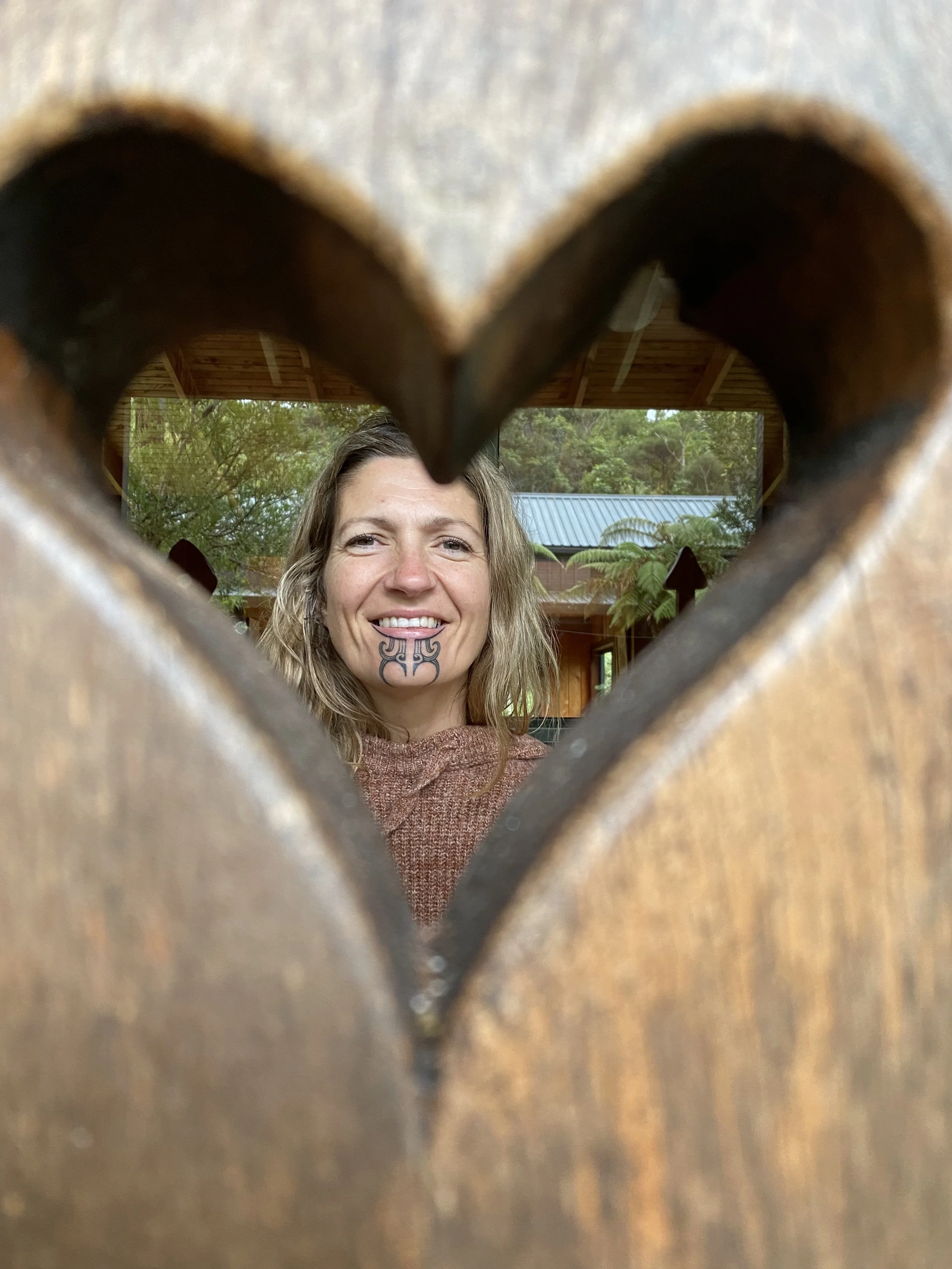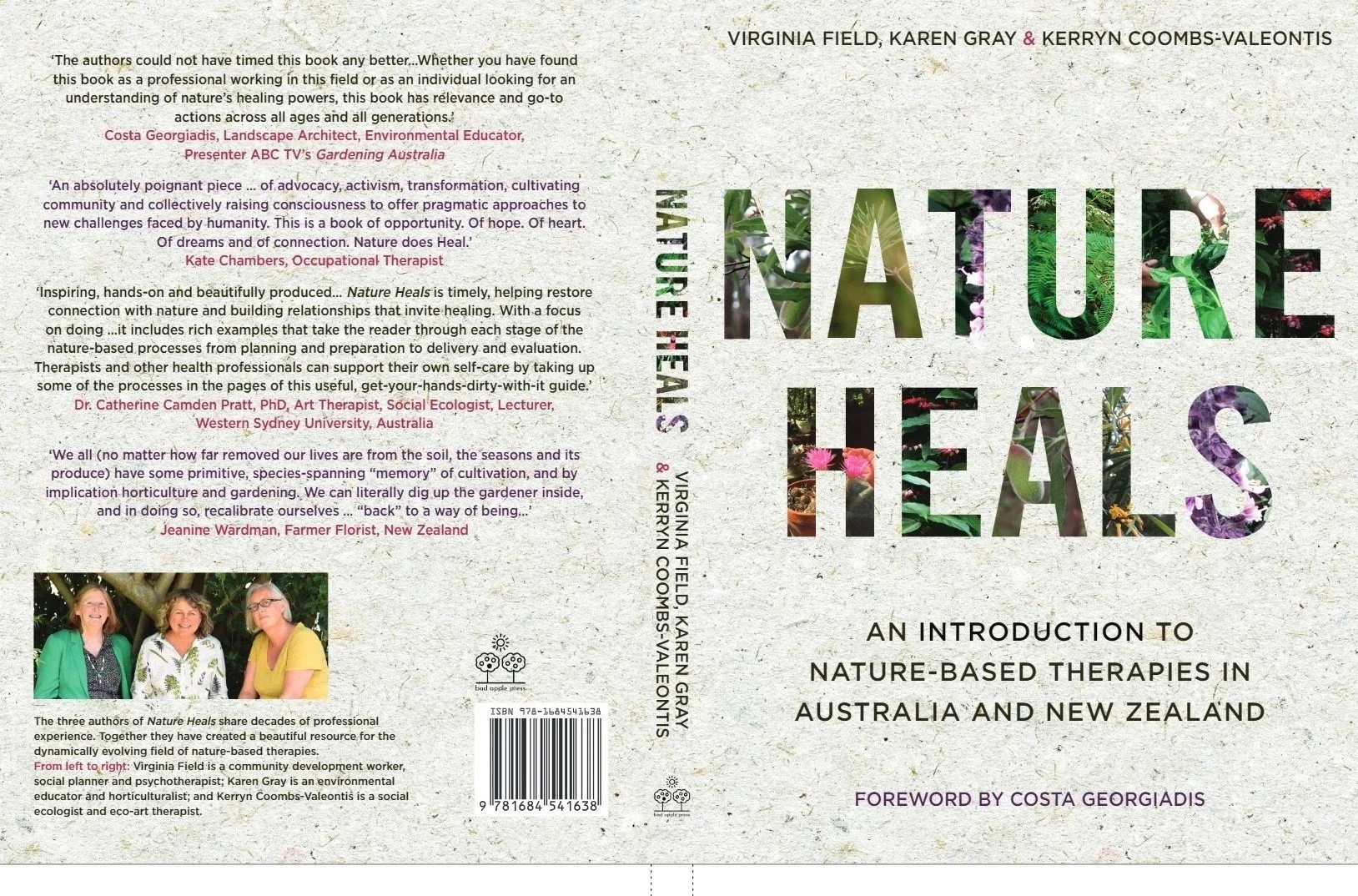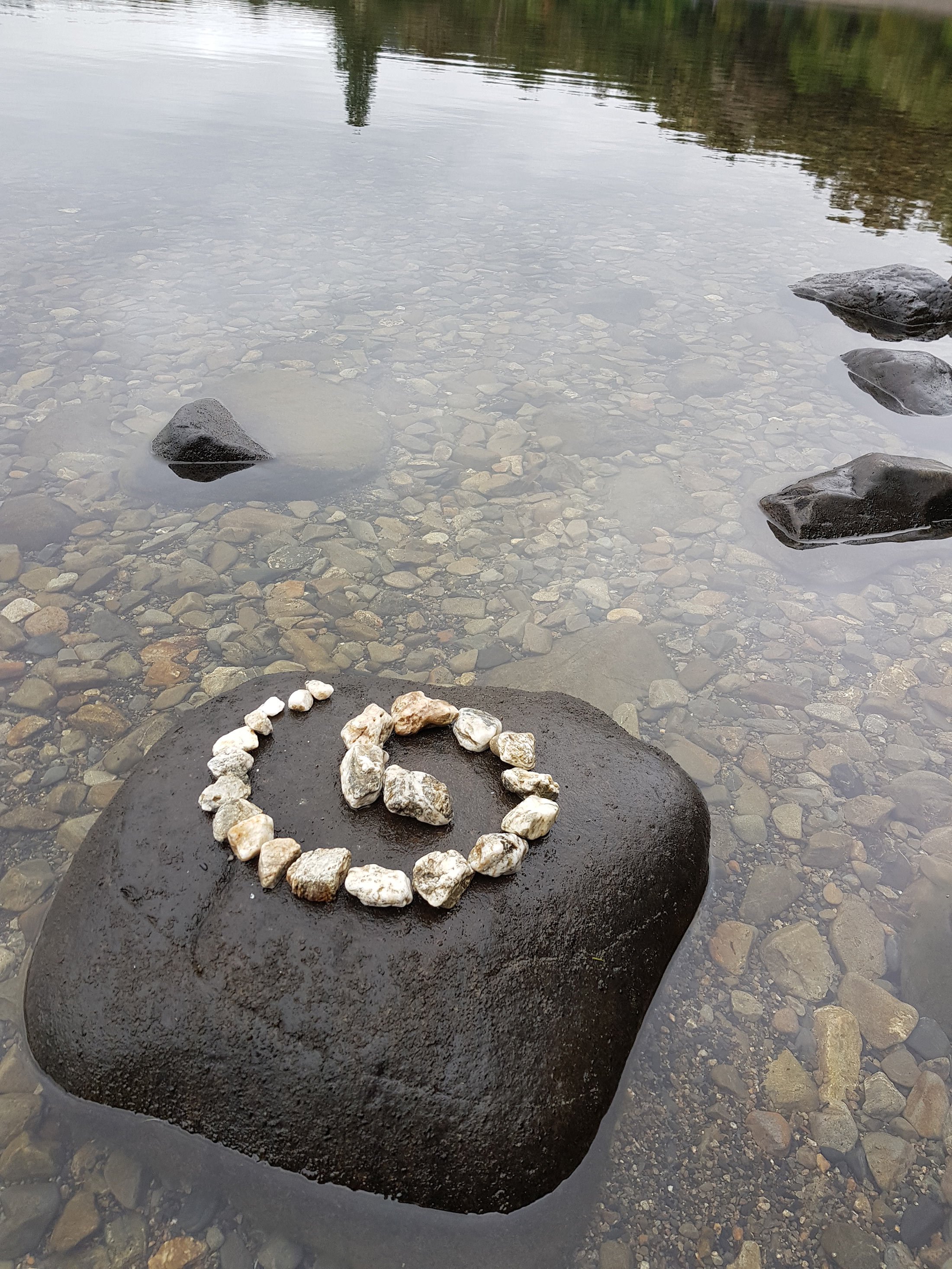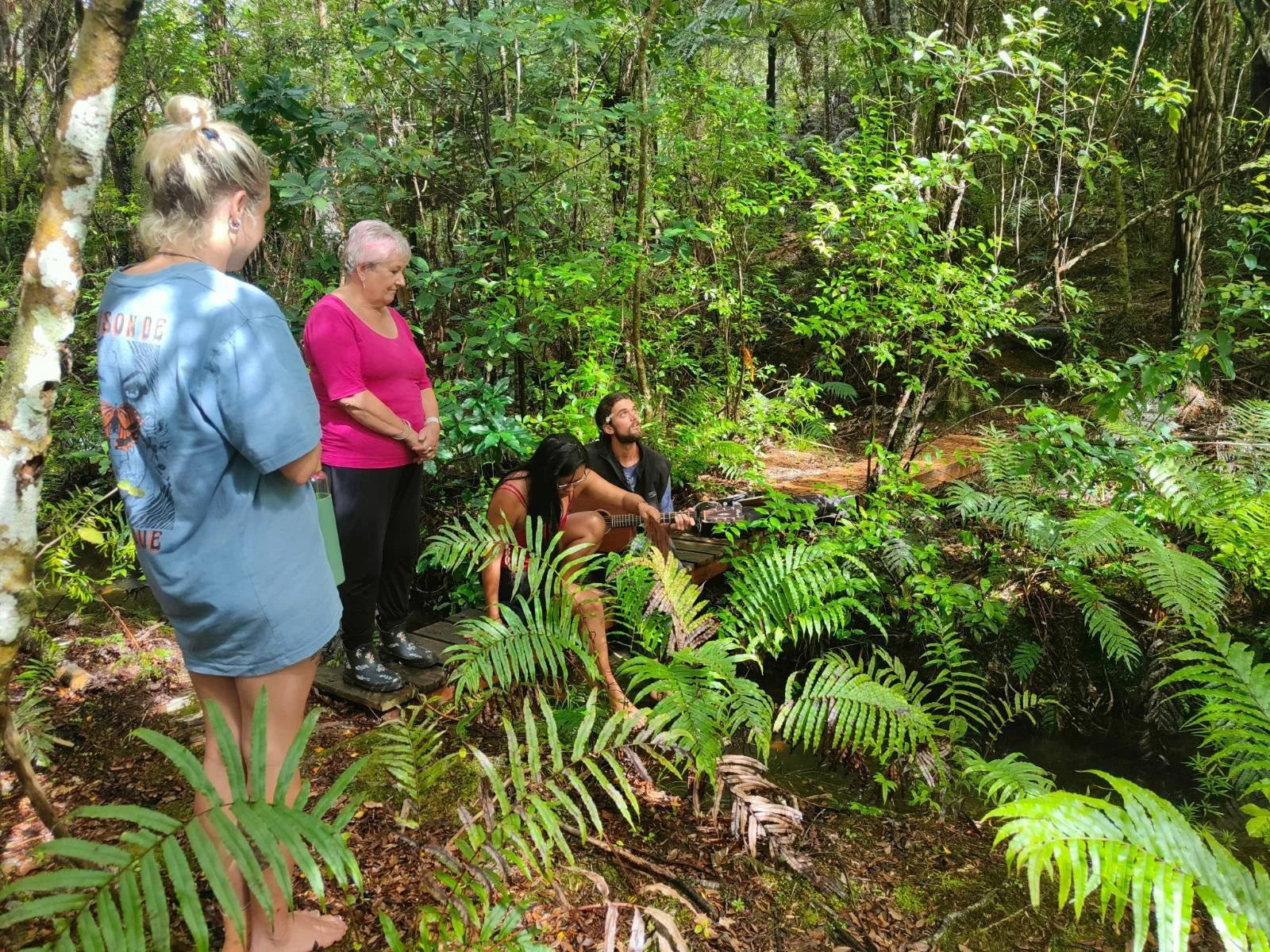
Eartheart Ecotherapy
Vocational & Creative courses, books and practioner developed resources to support growing your career with Nature
Eartheart Ecotherapy story…
The latest resource from Eartheart Ecotherapy;
OK Doomer: A creative and contemplative resource for supporting climate overwhelm.
This book premiered in a workshop at the Woodford Folk Festival 2025/26.
-
Eartheart Ecotherapy launched online in 2018, offering a Certificate in Ecotherapy approved by IICT (International Institute of Complementary Therapists.) My study in Social Ecology, and years working in human services in community gardens, with social and therapeutic horticulture projects. In 2019 Nature Heals An introduction to nature-based therapy in Australia and New Zealand was launched. I co -wrote this with my colleagues on the committee of Cultivate NSW, which has since merged in Therapeutic Horticulture Australia ( THA.) This practitioner-focused book was intended to support and inspire more Therapeutic Horticulture projects within human services and the community. We have received much feedback over the years that it has and all very are heartened by this. The first print run has nearly sold out and an E-book is being developed, launching early 2026, date tbc
Since then, we have grown to add the Advanced Certificate in Ecotherapy, also approved by IICT. WE have had over 0 students graduate and offer the work of Ecotherapy to the world.
-
Eartheart Ecotherapy launched online in 2018, offering a Certificate in Ecotherapy approved by IICT (International Institute of Complementary Therapists.) This had begun with my study in Social Ecology, that has enabled years working in human services in community gardens, with social and therapeutic horticulture projects. In 2019 Nature Heals An introduction to nature-based therapy in Australia and New Zealand was launched. I co -wrote this with my colleagues on the committee of Cultivate NSW, that has since merged in Therapeutic Horticulture Australia ( THA.) This practitioner-focused book was intended to support and inspire more Therapeutic Horticulture projects within human services and the community. We have received much feedback over the years that it has and all very are heartened by this. The first print run has nearly sold out and an E-book is being developed, launching early 2026, date tbc
Since then, we have grown to add the Advanced Certificate in Ecotherapy, also approved by IICT. WE have had over 0 students graduate and offer the work of Ecotherapy to the world.
What is Ecotherapy?
Presentation for Nature and Health Symposium 2019.
Ecotherapy residential at Te Moata Aotearoa/NZ residential in 2022
Meet the Team
-

Kerryn Coombs-Valeontis
FOUNDER
Kerryn is an author and teacher working in Environmental Education. She has completed a Master’s of Social Ecology at UWS in 2002. She has also completed a Diploma in Transpersonal Art Therapy. She has been a sessional lecturer and content developer at Nan Tien Buddhist Institute in Wollongong NSW since 2019 in the Mental Health and Social Wellbeing programs. She delights in connecting and supporting those who wish to work more closely with nature. She has independently published a collection of poetry in 2022 (in parentheses) Her latest publication OK Doomer is a creative and contemplative resource to support those working with climate overwhelm and ecological sorrow.
-

Kelly Jarvis
Residential Facilitator Aotearoa/NZ
Kelly Jarvis is a Co-facilitator on residentials in Aotearoa /New Zealand.
Kelly has been working in the family Violence and Health & Wellbeing sector for the last 15 years. Over this time, she has developed a Nature Based Therapy Practice; Puāwai. Puāwai is an intuitive and creative approach to therapy that is grounded in the concept of hononga; exploring the intrinsic relationships between people, Wairua, and Te Taiao; the magic and interconnectedness of everything around us in the natural world, and beyond. Kelly facilitates healing through the weaving of nature, Rongoa Māori, creativity, and storytelling.
-

Karen Gray
Module Tutor
Karen shares her passion for plants and people in creative engagement with over 30 years experience in Botanic Gardens, community gardens, private gardens and as a horticultural therapist in mental health, aged care and the disability sector. She feels strongly that gardens and access to nature is available for all in health care having witnessed beautiful transformations for participants. She has a Bachelor of Applied Science in Environmental Management & Tourism, Certificates in Disability Support, Horticulture, Bush Regeneration Supervision, Techniques for Horticultural Therapy and is co-author of Nature Heals An Introduction to Nature-based therapy in Australia and New
We have a vital opportunity now to shape new Western psychology that acknowledges humanity as, first and foremost, natural, of nature - not separate from it. Its time to rewild psychology, with ideas and methods rooted in the rhythms, patterns, principles, and other-than-human encounters of greater nature.H
Bill Plotkin
WIld Mind A Field Guide to the Human Psyche
”Trees and soils, streams and skies, animals and insects are co-participants – subjects in their own right…If willing, they can be our partners in establishing a healing sense of belonging and homecoming in a world riven by displacement.”
LINDA BUZZALL / CRAIG CHALQUIST
Ecotherapy Healing with Nature in Mind
—

NATURE HEALS
Launched in Australia by Clarence Slockee of ABC Gardening Australia & in Aotearoa/NZ by Kelly Jarvis in 2019.
Nature Heals; An Introduction to Nature-Based Therapies in Australia and New Zealand,
Co-authored by Kerryn Coombs-Valeontis, Virginia Field, and Karen Gray.
Foreward by ABC Gardening Australia’s Costa Georgiadis. A practitioner-developed resource book and comprehensive lens on how Nature-Based Therapy is establishing and emerging, and how we are doing it down under! Includes over 30 stories ranging from prisons to pet-assisted therapy - packed with passion, humanity, and joy!
First print run nearly sold out, e book coming early 2026. A few hard copies left are going going …
www.naturehealsbook.com
“A good sensible book, the best for this purpose that I have seen published in Australia. It needs widespread take up as a reference as covers many different social contexts. Fortunately, is is not confined to just horticulture or any single “nature” based therapy. Excellent for our clinical staff to learn and general information. Have a look I think it is great!”

Q: What is the vision of Eartheart Ecotherapy?
A: Eartheart Ecotherapy believes that healing the human-nature relationship by awakening the eco-self as a more authentic connection with the natural world, will contribute to the personal / collective shift from ego-centric to eco-centric. Eatheart Ecotherapy creates resources and courses to support those who feel the calling to work with nature more closely and support others in this shift in consciousness.
Q: What is unique about Eartheart Ecotherapy courses?
A: Eartheart Ecotherapy offers a contemplative and creative approach to learning that values reflection and deep listening. It has a vocational context that supports the application of nature based therapy in human services and in community. . Eartheart Ecotherapy does not assess you, instead it supports conversational and creative options for assignments such as voice recordings, art/earth art creation, story, and poetry etc. It also embeds a peer review and response process into assignments to enhance connection and grow your ecological imagination and perception. This returns the joy to learning, while decolonising our ecological imaginations.

Q: Who can benefit from Ecotherapy's courses and resources?
A: Eartheart Ecotherapy supports professionals in human services to integrate nature-based therapies into their practice, as well as those wishing to deepen their connection and healing with nature. It also supports those ecological imaginaries who wish to forge their own path in Ecotherapy, and co-create work with nature as co-therapist.
Q: What skills are essentail for ecotherapy practitioners?
A: Essential skills include a relational sense of the ecological self, and a sense of wonder that fuels an understanding of eco-centricity and its relationship to healing. An understanding of ethics, risk management, and group dynamics is also important. An openness to working more deeply with nature as a co-therapist which naturally creates humility and gratitude in the service of Ecotherapy.
Q: Is ecotherapy training suitable for beginners?
A: Yes, the Certificate of Ecotherapy is designed for those new to the field as well as experienced professionals looking to expand their practice into nature-based therapies.
MORE FAQs
Q: What are the benefits of Ecotherapy for humans?
A: Engaging in ecotherapy through Eartheart Ecotherapy fosters a deeper sense of connection to the environment as well as self and others. Research indicates that spending time in nature positively impacts mental health and improves well-being. Research also supports an increased sense of wonder, vitality, and compassion for self and others. Biochemically, stress responses of cortisol and adrenaline are reduced, and serotonin and dopamine are increased in nature.
Q: What are the job opportunities after completing Ecotherapy training?
A: Graduates can apply and integrate their nature-based therapeutic skills into existing roles in human services e.g. youth work, child services, education, counseling, project leaders, environmental projects etc. to increase and emphasize nature-based therapies. The Advanced Certificate in Ecotherapy Groupwork is specially designed to support graduates to create work opportunities within their communities as ecological imaginaries. You are supported to create a work placement in the community with all the necessary professional insurances for safe and ethical practise.
What students are saying
Why Study Ecotherapy?
Work from your relationship with Nature
A skilled facilitator working with nature as co-therapist, can invite awakenings of the eco-imagination and the eco-self is enlivened more impactfully.
Be part of what the world needs
The founder of Deep Ecology Arne Naess says that community therapies are needed, to awaken the eco-unconscious, and remember our integral interconnection to nature and heal human/nature split.
Build An Ecological Society
“Ecotherapy is Ecopsychology’s success story” Be part of a therapy that builds an ecological society and is much cultural and social, as it is personal.
Inexpensive (for you and your participants)
Ecotherapy answers urgent questions of our times, with methods offering a spectrum of relatively inexpensive earth-based healing approaches that support self-healing, informed by a rapidly growing evidence base.




